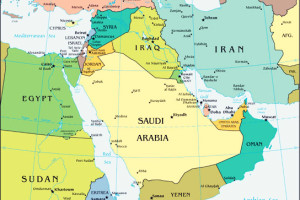High-level Iranian and Saudi visits to Moscow raise speculation

Recent visits to Moscow by the Iranian and Saudi foreign ministers, alongside talks with representatives of the Syrian opposition, have raised speculation that Russia could be acting as a mediator between Iran and Saudi Arabia as the lifting of sanctions on Tehran leave the situation in the Middle East in a state of flux.
(Russia Beyond the Headlines – rbth.ru – David Narmania, Nikolay Surkov, RBTH – August 19, 2015)
Russian Foreign Minister Sergei Lavrov and his Iranian counterpart Javad Zarif recently met in Moscow to discuss the development of relations between the two countries in the new international environment, following the signing of an agreement between Iran and the P5+1 major world powers.
On the eve of this visit to the Russian capital, the Foreign Minister of Saudi Arabia, and representatives of the Syrian opposition also came to Moscow for meetings. However, opinion is divided on whether Moscow is acting as an unofficial mediator between Iran and Saudi Arabia.
The meeting between Lavrov and Zarif was held on Aug. 17 in fundamentally new international circumstances, when the signing of an agreement between Iran and the P5+1 major world powers (the U.S., Russia, China, Britain, France, plus Germany) has led to the creation of conditions for the lifting of longstanding Western sanctions against Tehran.
One of the main topics of the talks concerned the implementation of the Plan of Action on Iran’s Nuclear Program. As it was stressed at the press conference, Russia will be playing a key role in the implementation of the plan.
In particular, Russia will remove Iran’s stockpiles of low-enriched uranium in exchange for natural uranium, as well as assist in developing the production of stable isotopes at the Iranian nuclear facility in Fordow. The Russian Federation will also build another eight nuclear reactors in the Islamic Republic.
“This is a very promising and significant direction, which will increase the supply of energy in Iran, while at the same time ensuring full compliance with non-proliferation, and also respecting Iran’s right to have a peaceful nuclear program,” said Sergei Lavrov.
Syria in the spotlight
One of the main topics of the meeting was the situation in the Middle East. Asked about Russia’s position as to the future of Syrian President Bashar al-Assad, Lavrov said that his country’s position remains the same as it was at beginning of the crisis, and that the fate of the Syrian president must be addressed only after the crisis is resolved.
“We have always advocated that the fate of Syria should be decided by the Syrians themselves – without outside intervention, without any preconditions, without any quick fixes being imposed by external players, from anywhere in the world,” said Lavrov.
Javad Zarif noted that the positions of Iran and Russia coincide on this point. “The only way to solve the Syrian crisis is through political dialogue,” he said.
Backroom deal with Saudi Arabia?
Shortly before Zarif’s visit, (on Aug. 11 and 14, respectively) Moscow was visited by the Minister of Foreign Affairs of Saudi Arabia Adel al-Jubeir and representatives of the National Coalition for Syrian Revolutionary and Opposition Forces. This gave grounds to rumors of a possible mediation role being played by Moscow, which has repeatedly stated its desire to reduce tensions in the region arising due to events in Syria.
Nevertheless, some Russian experts do not agree with this take on the situation. Yevgeny Satanovsky, president of the Institute of the Middle East, told RBTH that “the fact that Sergei Lavrov met with the foreign ministers of Saudi Arabia and Iran, as well as with the head of NCSROF in just six days – is pure coincidence.”
According to him, Saudi Arabia is simply unable to agree on anything with the Iranian Shiites due to religious differences, and hence, in principle, Russia cannot act as a mediator.
However, Andrei Baklanov, former Russian Ambassador to Saudi Arabia, and now deputy chairman of the Association of Russian Diplomats, did not rule out the possibility that Moscow is trying to ease tensions in Saudi-Iranian relations. Nevertheless, he believes that Russia currently does not have sufficient resources to act as an intermediary between Iran and Saudi Arabia.
“Yes, in the future, under certain circumstances, this should be possible, but the required conditions for this do not exist at the moment,” said the former diplomat.
He added that Russia would certainly like to see a reduction in the level of tensions in the region: “Russia proceeds from the point of view that relations between the two key players in the region should not be directed at confrontation – and so our country’s leadership is taking the appropriate measures.
“The results so far have not been impressive, since, as the Foreign Minister of Saudi Arabia Adel al-Jubeir clearly stated – ‘the positions of Iran and Russia on Syria differ from the position of Saudi Arabia. Nevertheless, the general background of relations in the region could improve if we continue to work in this direction.'”
Article also appeared at rbth.com/international/2015/08/19/high-level_iranian_and_saudi_visits_to_moscow_raise_speculation_48607.html
